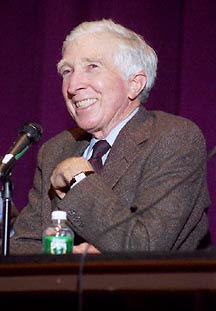 No matter our religious belief, practice etc...we all suffer (I think) from the ebbing and flowing of the spirit. Often within the same day, what seems alive and luminous one moment is far from our vision the next. Especially in our culture of instant gratification and comfort at all costs is this true. I have gone through very long and very dry spells of the spirit. Spells of vain grasping after a feeling that I think I may have felt once and am trying to get back.
No matter our religious belief, practice etc...we all suffer (I think) from the ebbing and flowing of the spirit. Often within the same day, what seems alive and luminous one moment is far from our vision the next. Especially in our culture of instant gratification and comfort at all costs is this true. I have gone through very long and very dry spells of the spirit. Spells of vain grasping after a feeling that I think I may have felt once and am trying to get back.Rufus Ellis has some wise words for this condition in his sermon, "The Tides of the Spirit"
"THERE are times and tides of the Spirit. It is given sometimes by measure and sometimes not by measure... Sometimes we are in the Spirit, — not always. Sometimes we can recognize the presence and the help of God,— not always. Sometimes the Spirit witnesses unto our spirits, — not always. And we find that what is true of ourselves is true of others, true of the best; that they also are not always in the Spirit. Sometimes we are left to our native capacities, and to the light and love that are garnered in holy oracles and blessed traditions of the past; and the struggle of life goes on in no nearness to God, and under closed heavens; the Sundays are Whitsundays only in name; the great and deep sea still lies out before us, but there comes no divine breath to send us beyond our soundings and our shallows...And I think that we must accept this as the law of our spiritual life, even in Christendom. God means that it shall be so...
Strengthen the things which are always yours; make the most of what God has already given you, in what you call your higher nature, — in your reason, your conscience, your moral sense, your free-will, your Bible, the example of your Master. God asks us to obey Him, and gives us light and strength for that, — some beams from heaven always, but not necessarily a halo about the head, or fervors of heart and spirit...God asks of us a great deal of routine work. He would learn whether we will keep His commandments or no. That Voice to us is always steady and plain, to-day and to-morrow and the day following; we must not always be listening for other and more exhilarating voices. Our religious life cannot be a continual renewal of the deepest faiths, the most intense feelings, the deliciousness of prayer, the overflowings of joy, the delicacies of piety. It is not safe for us to expect such things, because, as I suppose, it is not safe for us to have them... rather must we give ourselves in all soberness to such plain exercises as self-control in all its forms, the best use of time and talents and wealth, the better ordering of our household, the application of moral truths which are known and acknowledged, — a self-denying charity, a truth-telling sobriety. It is easy to exhaust the soul in the endeavor to stimulate its emotions, but there is a limit to religious sensibility; and we shall do well to regard the duty and conscience of piety rather than the exhilaration we are to find in it...If we do not cease from plain duties for lack of ardent faiths and strong emotions and sensible helps, if we keep on working and asking, the Day of Pentecost will surely come, and our religion shall be as joyous and tender as it has been honest and practical...
The Spirit will come; the Spirit is whispering in our hearts now... learn to trust utterly and always in Him who seems sometimes to hide Himself very strangely; come into a rooted resolve of a larger obedience; commit yourself to a nobler life; let the Bread of God nourish you for a continual service; and let your covenant with the Unseen and Eternal be an everlasting covenant."
Blessings



















